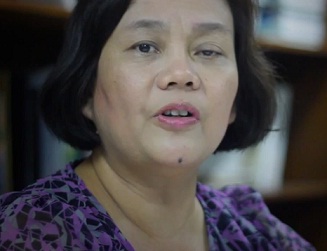By Ellen Tordesillas, VERA Files

Bacalso said she was informed Thursday by the embassy of Argentina in the Philippines of the award “in recognition of her work against enforced disappearance in Asia and the world. “
Bacalso will travel to Buenos Aires on Dec. 10 to receive her award in a ceremony to be attended by Argentinian government officials. Aside from her funded travel to Argentina and a plaque, Aileen will also have speaking engagements in different organizations.
Bacalso said “I will be honored to receive this prestigious award soon which will be given not only to me but also to the disappeared and their loved ones and the rest among us in this bigger global movement against enforced disappearances. Let this be an important victory for the cause of the disappeared and their families in the Philippines, in Asia, in Latin America and in the rest of the world.”
Established in 2007 by the Argentine Ministry of Foreign Affairs and , International Trade and Worship, the Emilio Mignone International Human Rights Award grants recognition to foreign institutions and/or individuals residing abroad that are making or have made an outstanding contribution towards the promotion and/or protection of human rights in their own countries in the fight against impunity in cases involving systematic violations of human rights, discrimination and social, economic and cultural rights, among other areas.
The award was named after Argentinian lawyer and educator Emilio Fermin Mignone, who became an active human rights campaigner after his daughter disappeared during the military regime’s ”Dirty War” in the mid 70’s to early 80’s.
The 7th winner of the Emilio Mignone International Human Rights prize, Bacalso is the first individual awardee. Past winners include the Asociación de Familiares de Detenidos, Desaparecidos y Mártires por la Liberación Nacional de Bolivia (ASOFAMD); Comisión Colombiana de Juristas (CCJ); Washington Office on Latin America (WOLA); Zimbabwe Lawyers for Human Rights (ZLHR); International Rehabilitation Council for Torture Victims (IRCT), Denmark; KontraS,The Commission for the Disappeared and Victims of Violence, Indonesia; and The Human Rights Institute of the ‘‘José Simeón Cañas’’ Central American University (IDHUCA).
A human rights activist since her student days, Bacalso has experienced the trauma of having a member of the family “disappeared” when two months after being married her husband, Edsil Bacalso, was abducted by the military in Nov. 1988. She went through the ordeal of searching for her husband from one military camp to another. The military was forced to release her husband after she got the information from a detention escapee about his whereabouts.
Formerly a chairperson of the Families of Victims of Involuntary Disappearance (FIND) Philippines, Bacalso initiated the gathering of organizations of families of the “Disappeared” in Asia, Latin America, and Africa that led to the founding of AFAD in 1998.
AFAD, which is the Focal Point of the International Coalition Against Enforced Disappearances (ICAED), is a federation of human rights organizations working towards the vision of a world without desaparecidos.
(VERA Files is put out by veteran journalists taking a deeper look at current issues. Vera is Latin for “true.”)
Evacuees sa Zambo, isa-isang nagkakasakit at namamatay
http://www.abs-cbnnews.com/video/nation/regions/11/03/13/evacuees-zamboanga-getting-sick
All because they want to save the Pork, and the DAP.
Sabi ilalaan ang pork for Zambo and Bohol. But the pork is tied up in litigation in the Supreme Court. If they truly are concerned for the victims, the President could have certified a bill for emergency appropriations. How long did it take for the House to approve the impeachment? A few hours? I’m sure they could have moved just as fast to appropriate for Zambo and Bohol.
But they would rather save the pork, so they are waiting for the Supreme Court litigation, which will be heard on the 11th, and maybe, decided in a few weeks, if the Court moves fast. Meantime, namamatay ang mga tao.
So if, and when they do get the go-signal to use pork for Zambo and Bohol, huli na ang lahat. Aahin pa ang damo kung patay na ang kabayo? Ipakain sa mga buwaya.
If the Congress was sent a certified bill after the calamities, money could have been appropriated in a day. Simultaneous bills could have been filed in the House and Senate.
So you see, all the bleeding heart declarations about using pork for Zambo and Bohol is just posturing, so that they can save their blank checks. That is what pork is, actually – blank checks for the swines.
Above, I said, if and when they get the go-signal. But pork is actually unconstitutional; so is the DAP, as I will explain in a later post.
Magsisimba muna ako.
First, we congratulate her for the award.
Human Rights groups like ours are perceived to be pro-left and anti-right. We do not dispute that many people suffer abuses from the military and government. However, when atrocities and murders are committed against the soldiers and police, we don’t hear much from Human Rights Commission. A clear example is the recent Zamboanga crisis. HRC said it would investigate the abuses on the MNLF rebels and make sure their rights were protected. What about the rights of the soldiers, police and civilians?
International groups like Amnesty International are also viewed with suspicion. Some believe that these groups are just fronts of foreign governments or intelligence groups. World Vision is also one. So called volunteers and missionaries are sent abroad, but sometimes they have different agendas.
Snv, I’ll transfer your comment to the succeeding post: “Aquino and the beetle experiment.”